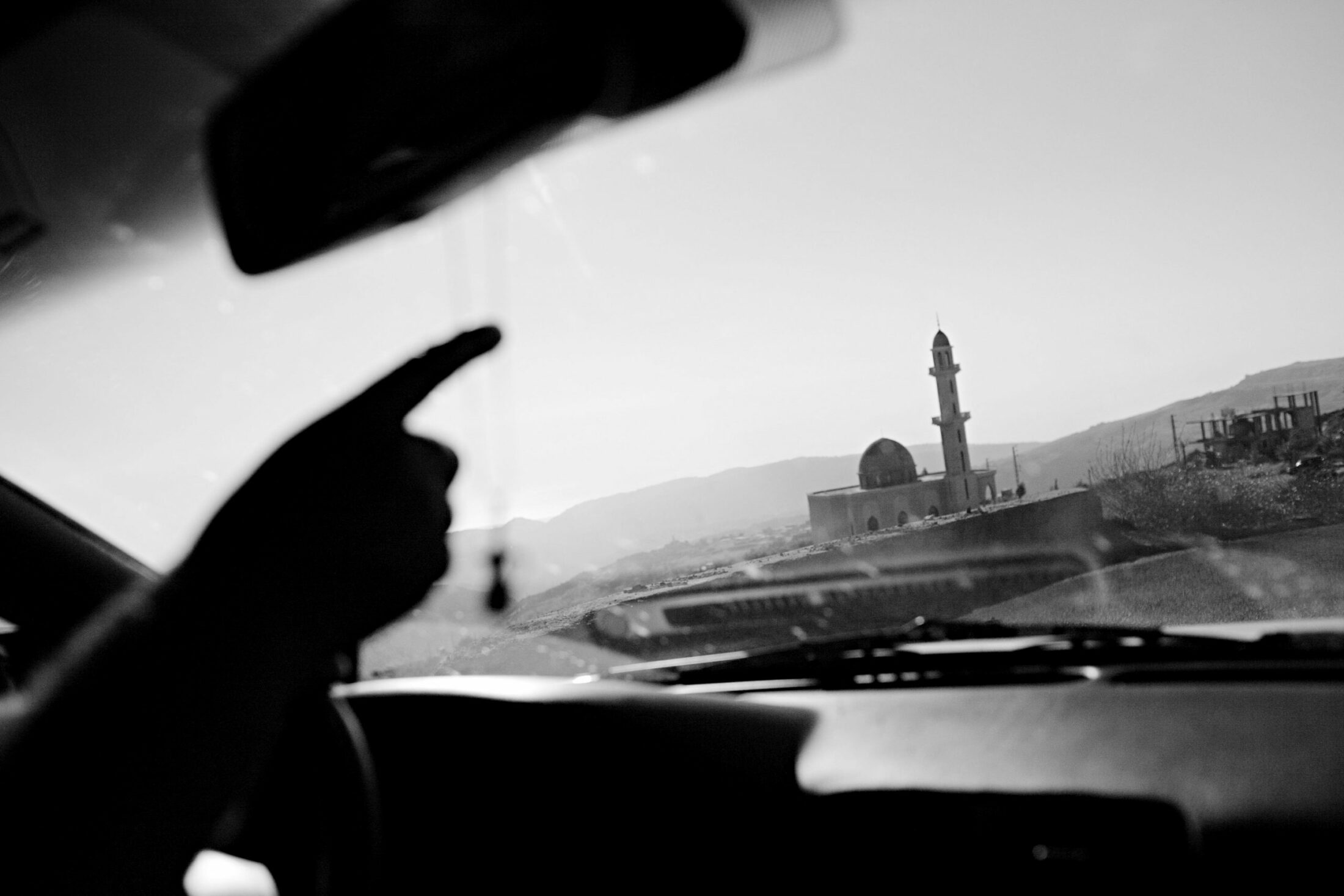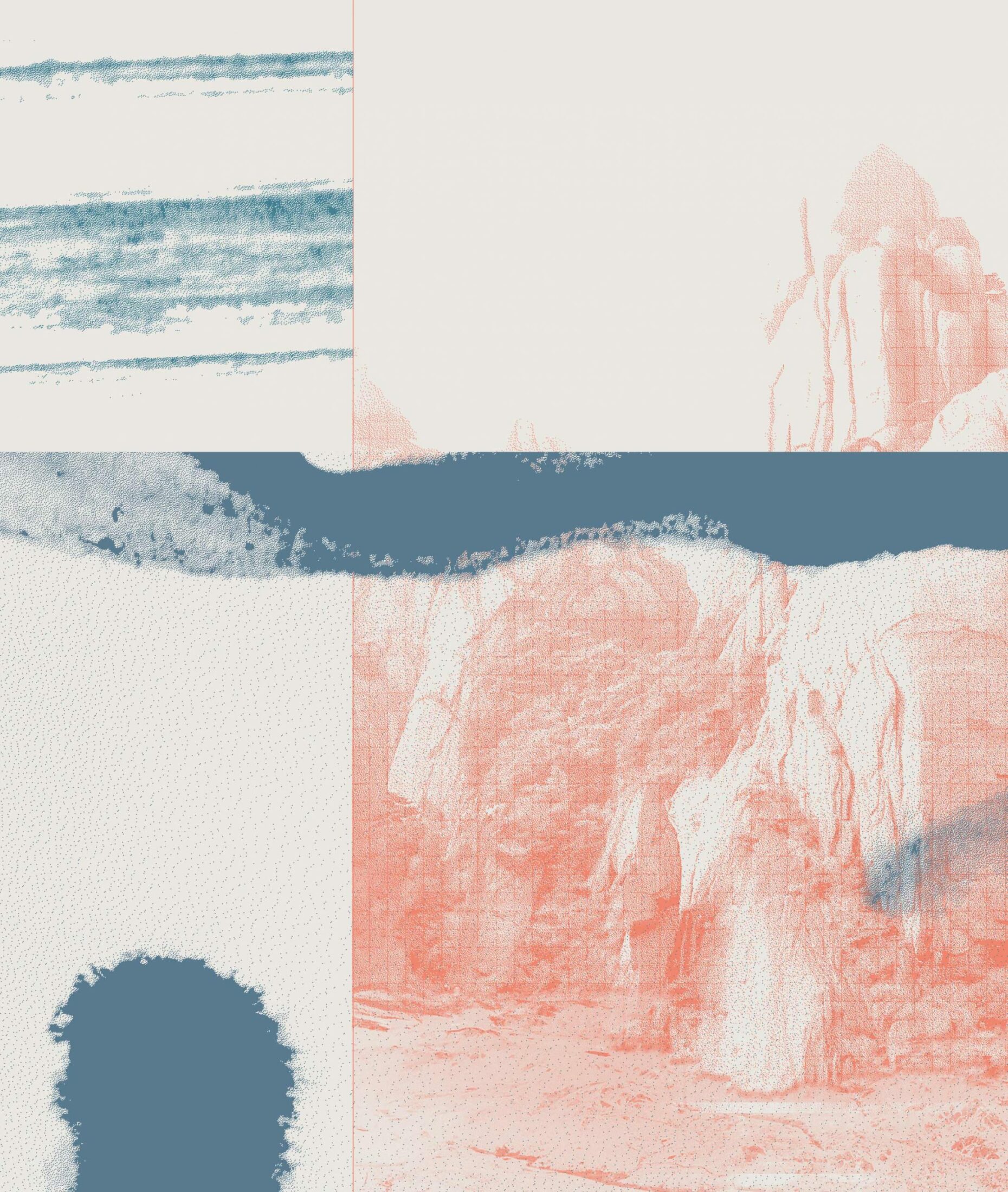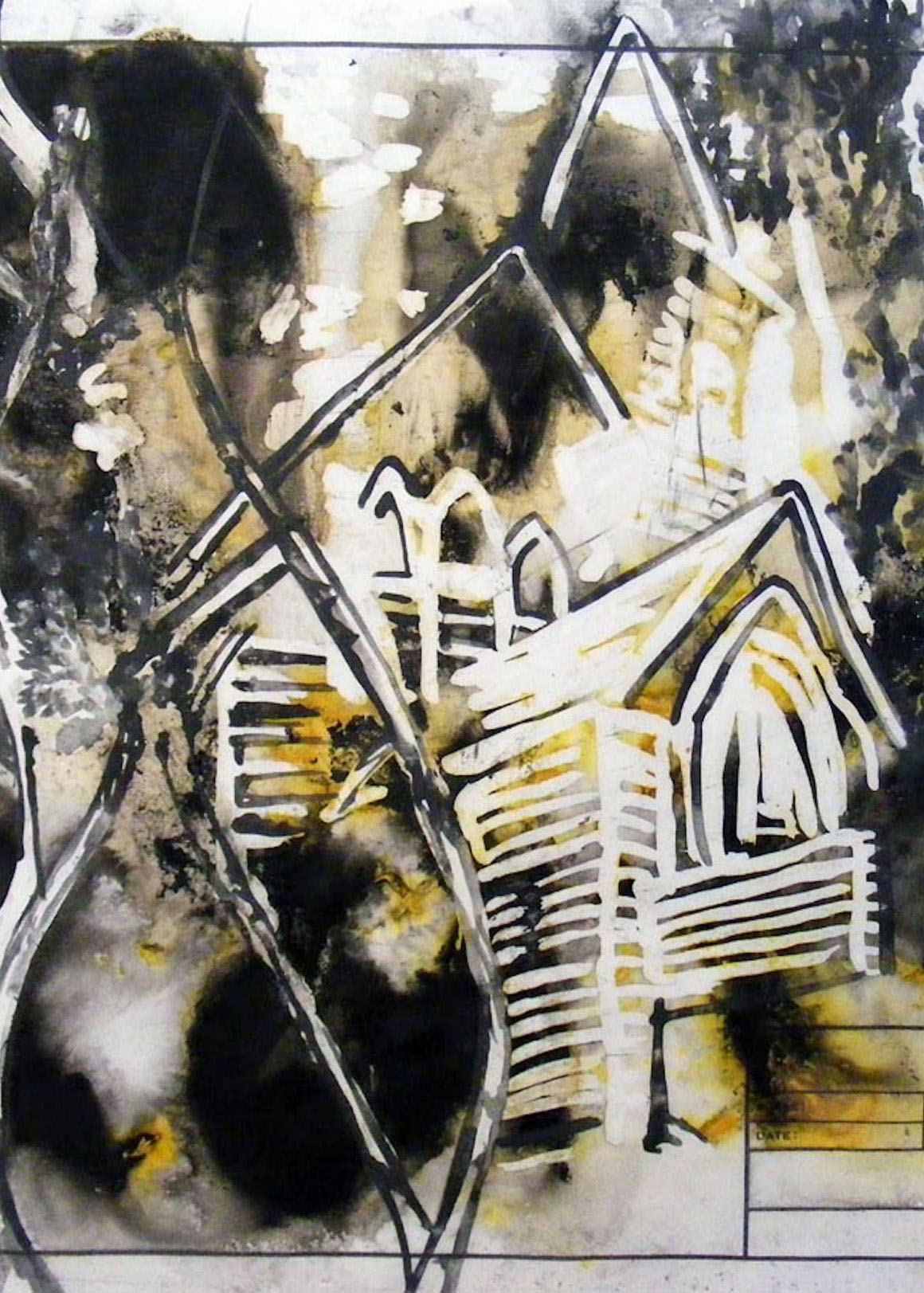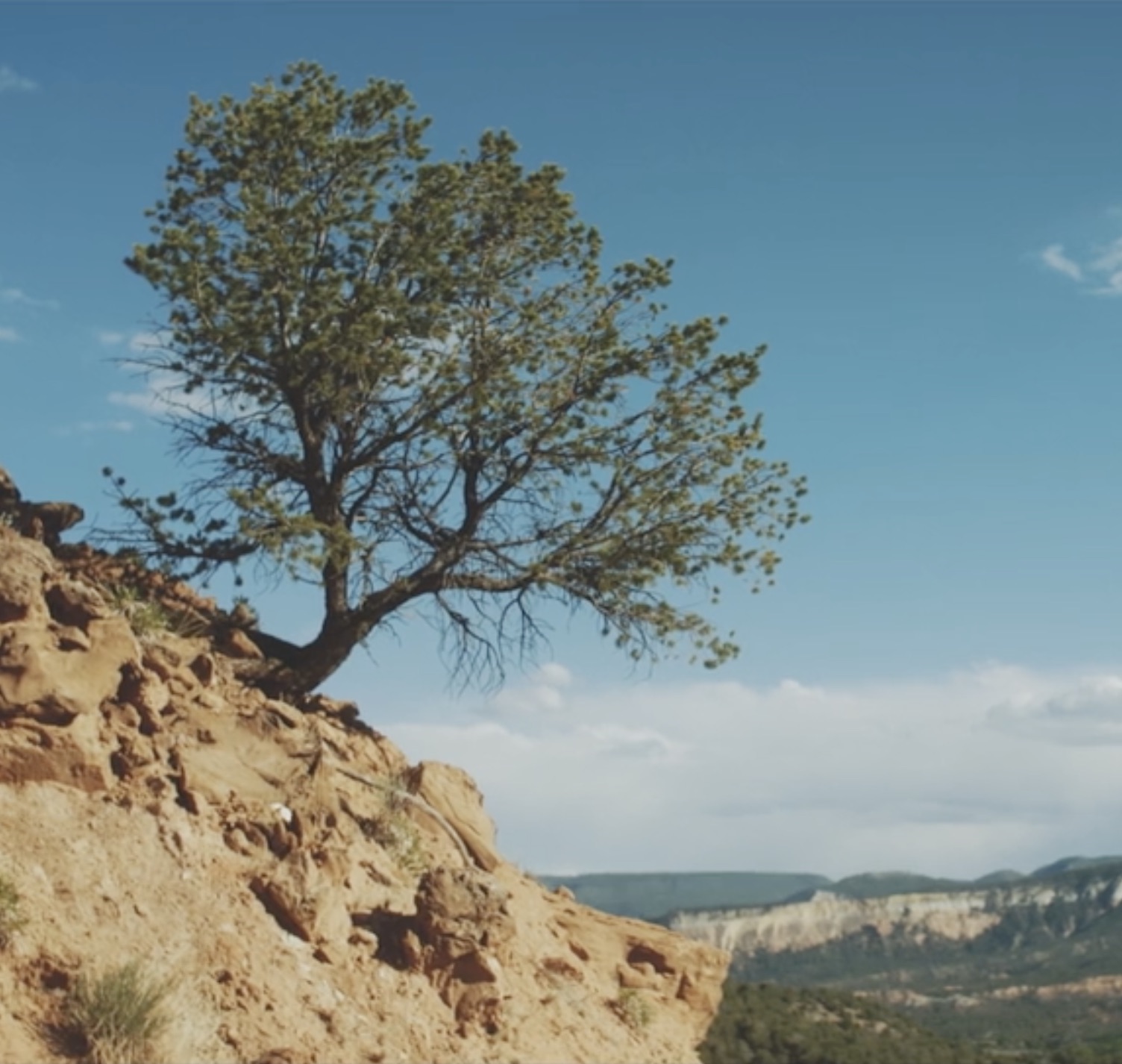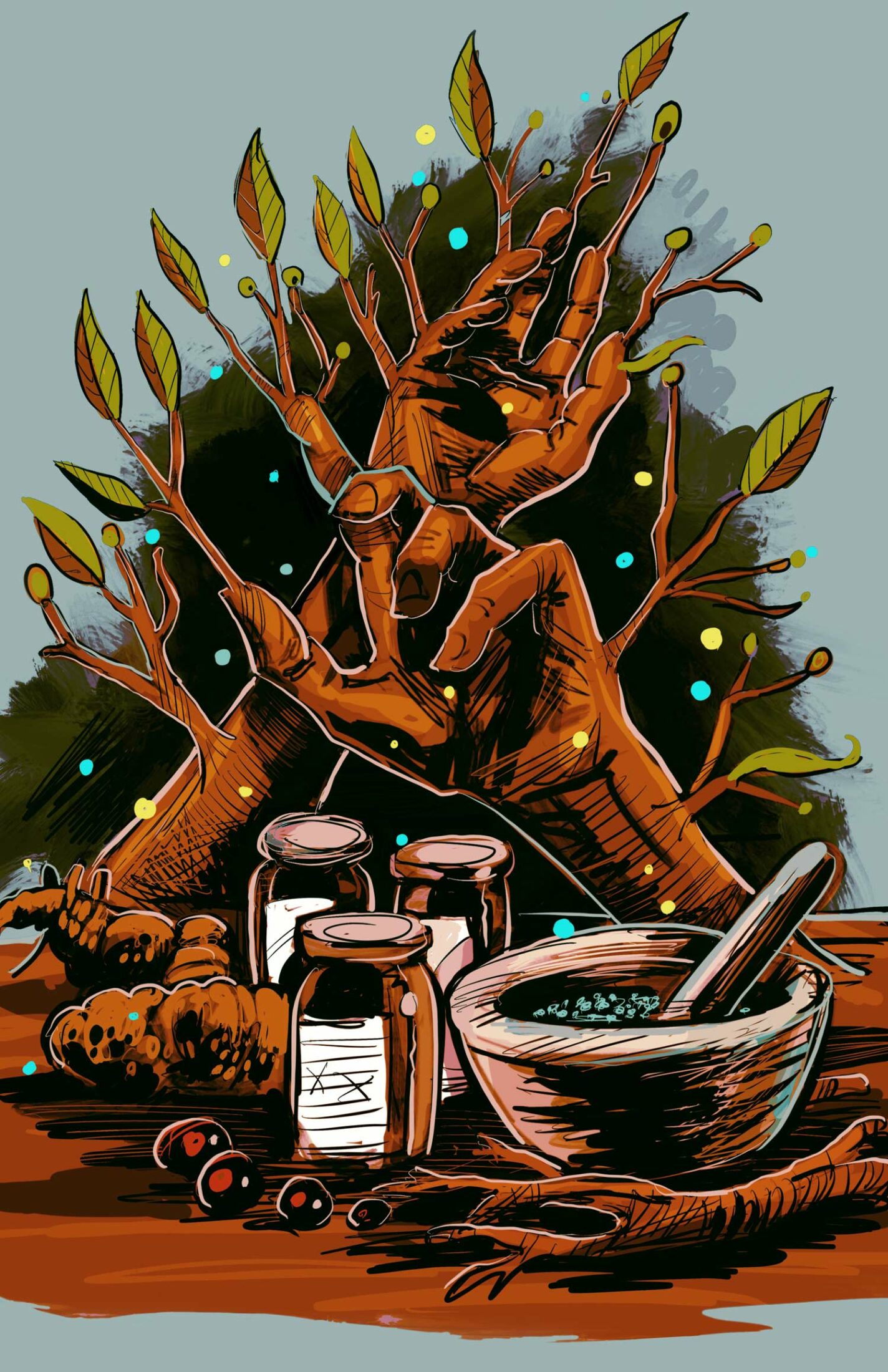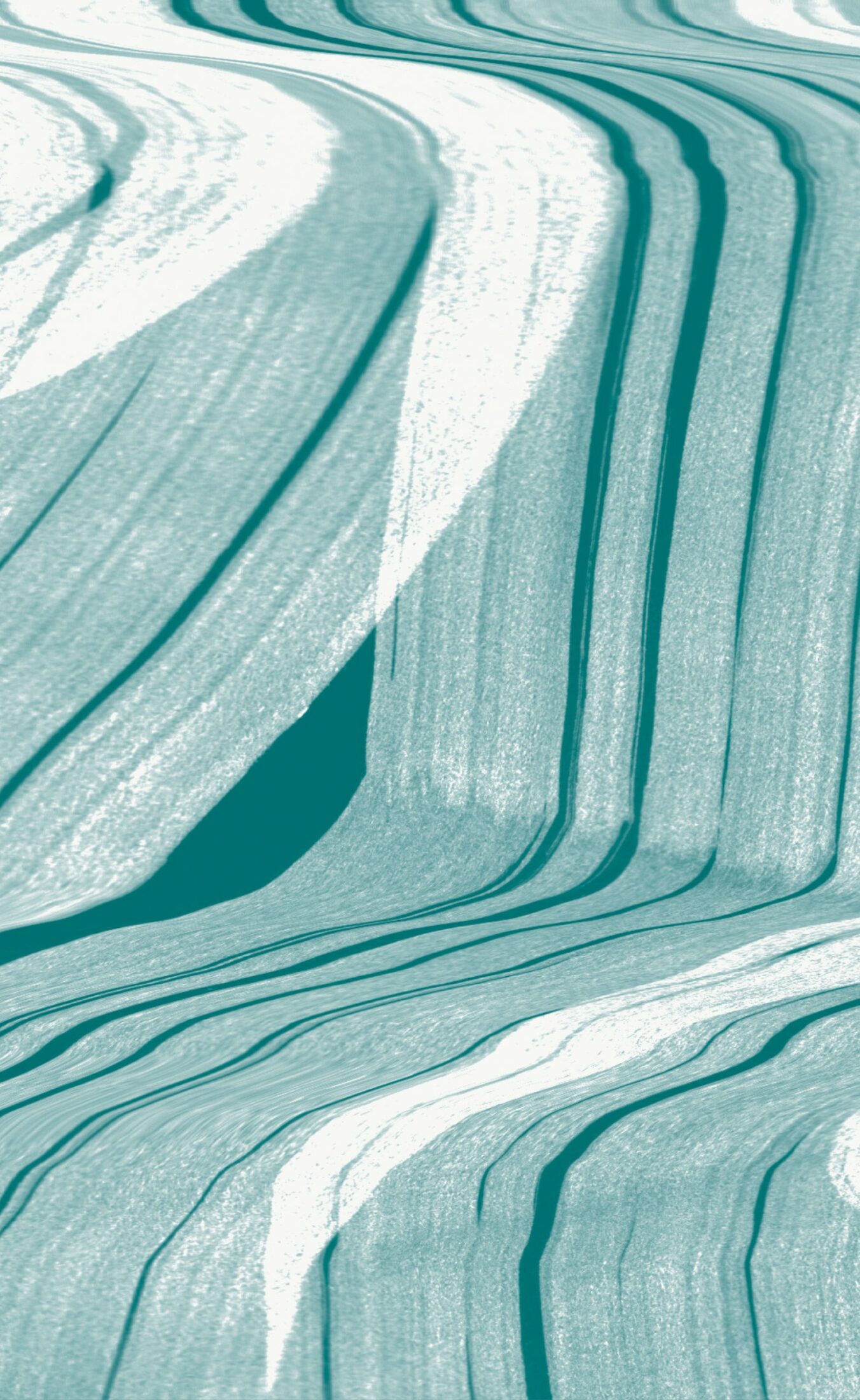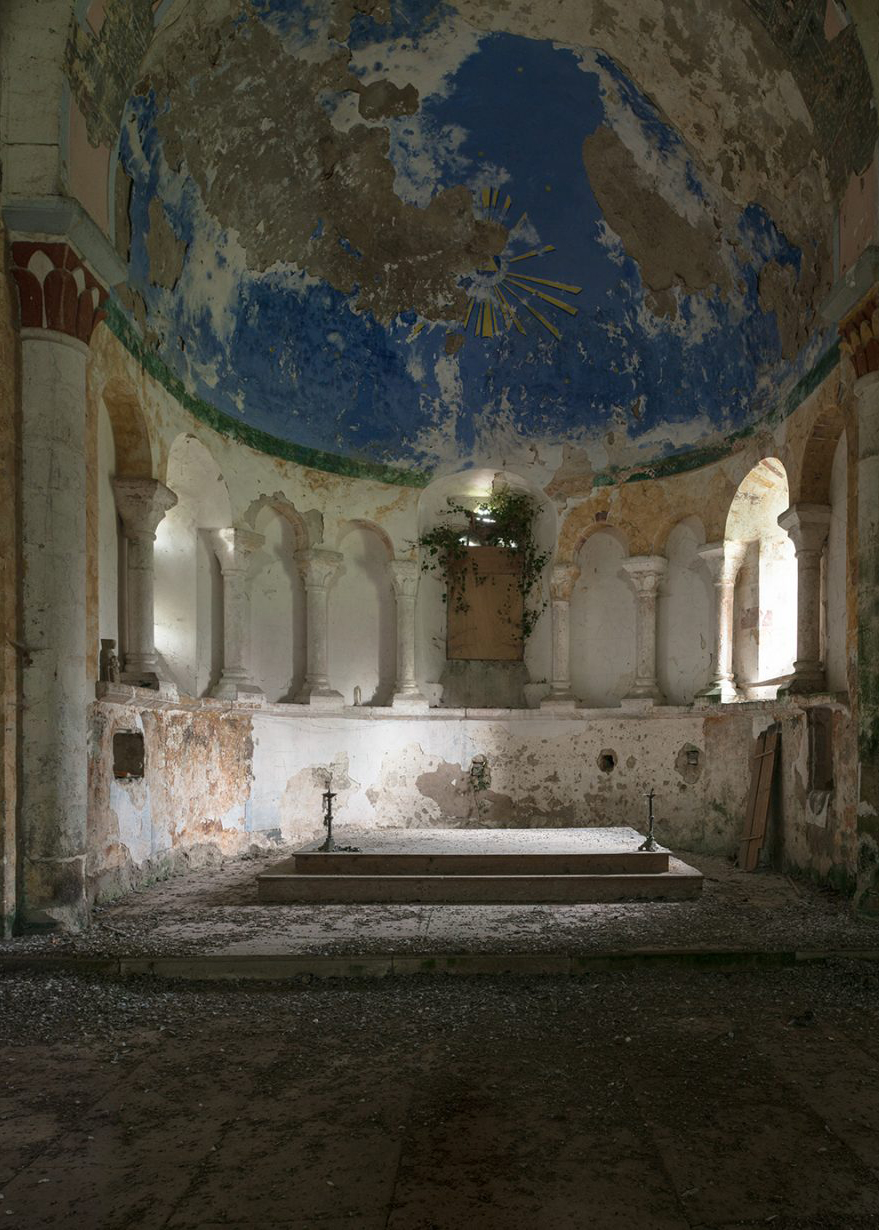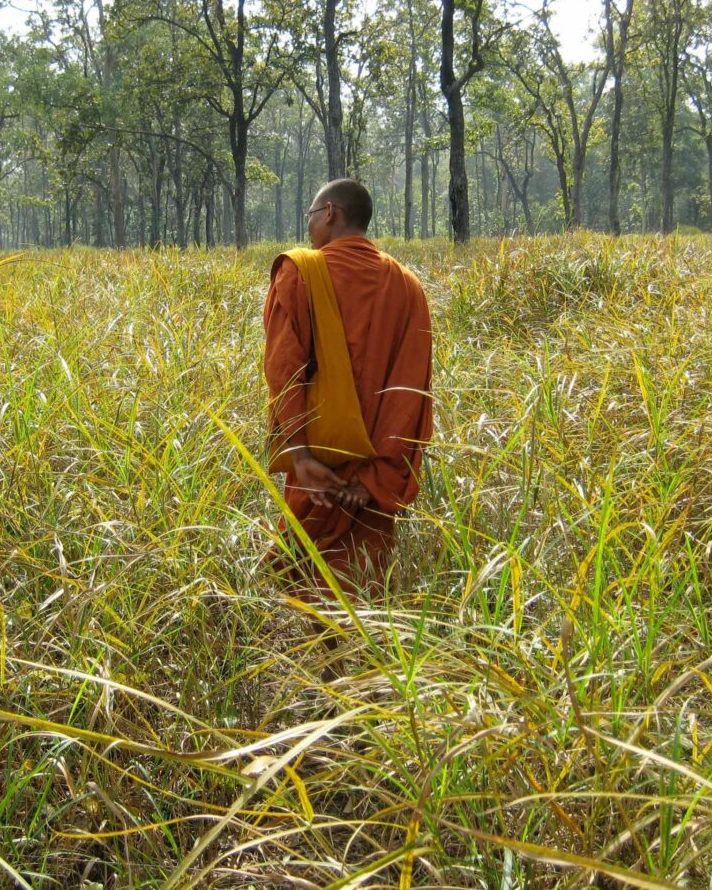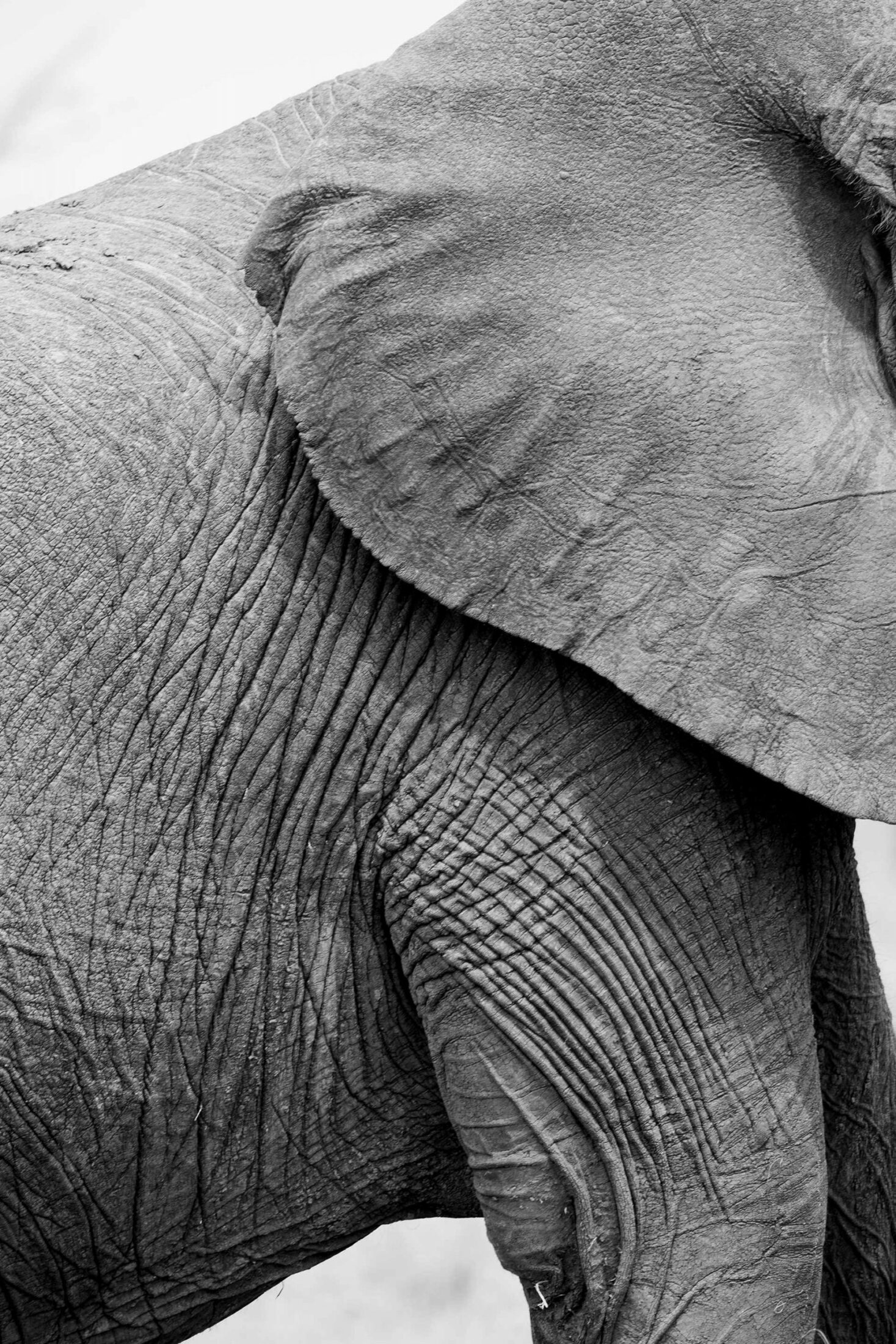
Hala Alyan is the author of the novels The Arsonists’ City and Salt Houses—winner of the Dayton Literary Peace Prize and the Arab American Book Award and a finalist for the Chautauqua Prize. She has published four collections of poetry, most recently The Twenty-Ninth Year. Her work has been published by The New Yorker, the Academy of American Poets, Lit Hub, The New York Times Book Review, and Guernica. She lives in Brooklyn, where she works as a clinical psychologist.
Struggling to explain her belief in God to her atheist husband, Hala Alyan reflects on her Muslim faith as inextricably linked to her family, to Palestine, and to histories of erasure.
It is early evening and the lights are low, and we are arguing about God. Or perhaps we are arguing about clarity. “Explain what you mean,” you are saying. “A man in the sky? Fire and brimstone? What do you believe in?”
I shrug. I don’t know.
Your devotion to atheism is steadfast: the world is a place of statistics and flukes, and what is unforgivable to you is ambiguity. You could handle, you say, a straightforward Muslim. A Catholic. Someone who operates by the book—any book.
I take my cues for faith from heartbeats and foliage. This is inconceivable to you.
You hate when I use the word “God.” It frightens you on an instinctual level. It’s disorienting and untenable, but more than anything, you dislike anything that can’t be explained in calm, logical tones.
I don’t help with this. A lover of fiction and magicians, I’m perfectly content not knowing how things work. As a child, I was devastated to discover that engines—not the breath of huffing creatures—kept airplanes afloat. Not having a single answer means there are endless possibilities, and I’ve always been happiest at the opening notes of the movie, on the first day of vacation, when the world unfurls in front of me with endless possibilities.
The other problem is vocabulary. How to explain the phenomenon of toes digging into sun-warmed sand to someone raised in tundra? How to explain goose-bump instinct? I’ve sometimes envied those who’ve arrived at faith later in their lives—after long, methodical study, or perhaps a life-altering event—a language to cloak their belief in. What’s harder to put into words is an intuitive understanding, since earliest memory, that we are not alone in this world, that there is something—of and with us—that creates and is created.
In other words: divinity. In other words: faith.
My favorite thing to do as a child was to hide inside the clothing racks in department stores. I would feel the whirl of dresses and pants around me as I curled my knees to my chest. The hollow was always muted and lovely, fabric whipping my face and arms every time a shopper flicked through them. I watched the clothes embark on their new lives. I could hear my mother but not see her. I could hear the voices, mostly female, of other shoppers. Sometimes I’d peel the stickers from hangers and roll them up into little foam cinnamon buns and pretend to eat them.
At night, after my prayers, I’d envision God as this—the clothing rack, the perfume, the sound of others nearby. The aloneness in the midst of motion. I learned to witness from the periphery.
Saddam invaded Kuwait when I was four years old, uprooting our lives and so many others. It was 1990, a week after my birthday, and my memories from that time are a jumble: a long car ride, heat, prayers. I remember televisions—always on the news channel, with images of smoke and desert—once we arrived at my aunt’s apartment in Oklahoma. My parents sought asylum in the United States, and for years after, we moved as if it were our calling: Oklahoma. Texas. Maine. Lebanon. The United Arab Emirates. Our story is not unique among the diaspora; when there is a rupture in identity, the center often does not hold. Moving becomes easier than fabricating roots; any effort toward the latter only highlights the dislocation.
The invasion proved to be a second exodus for many Palestinians, including my father. Thousands of Palestinians were forced to leave their home during what is known as the 1948 Nakba. Now it was happening again. Palestine fractured us. Then it arrived as a haunting. It stood in the corner of every new room, reminding us of what was no longer ours. Growing up in a diaspora means normalizing interrupted narratives—there are no ancestral houses, no legacy schools, no ritualized sense of place. I claimed Palestine throughout my childhood, despite not stepping foot on her soil until my twenties, and sometimes I wonder if that’s the source of my visceral, automatic faith: I grew up practicing a belief in things I could neither see nor touch. To claim a cleaved identity is as audacious an act of loyalty as kneeling eastward and reciting ancient words. From the day I was born, faith was inexorably linked with Palestine. With place.
History is fraught with erasure. The stories and lands and languages of marginalized people have long been erased through textbooks and headlines and revisionism. Nowhere is that more true than in the practice of religion, our innermost beliefs and values. Colonizers and occupiers have long recognized how powerful faith is—how it can be standardized and regulated. You must have people fear a particular god in order for them to respect the state that is an extension of that god. Nowhere is this more apparent than in the tradition of settler colonialism, of upending a people and their ways not only through bloodshed and imprisonment but also through the complex violence of historical tabula rasa: the rhetoric that says unpopulated lands are waiting to be plucked like cherries, that whitewashes the faces of previously inhabited places.
It isn’t a coincidence that one of the most insidious ways of erasing heritage has been missionary work. To truly understand how dehumanizing its legacy is, imagine hundreds of thousands of well-off foreign Muslims entering the United States with the sole purpose of converting Americans, papering grocery stores with flyers, casually bulldozing churches, and discarding statues of Jesus. It wouldn’t be seen as humanitarian work; it would be seen as an overt act of war.
Throughout history, colonizers haven’t just displaced indigenous people; they’ve decimated their worship. Indigenous communities in the United States were banned from practicing non-Christian rituals and ceremonies well into the twentieth century. The advent of the Holocaust drove countless Jewish worshippers across the world into hiding, discarding jewelry and Torahs and religious attire. In recent years, Israelis have repeatedly restricted the access of indigenous Palestinian—and other Muslim—worshippers to the al-Aqsa Mosque.
These aren’t coincidences. It’s a calculated erasure to continue the legacy of occupying land, resources, and, in some cases, the bodies of marginalized communities. To break a people, one must often break their faith.
I am a cultural Muslim. Sometimes even I don’t know what that means. The five pillars of Islam are faith, prayer, charity, fasting, and pilgrimage. I grew up in a house that gave zakāt. Sometimes I fasted. Mostly, I spent my childhood reciting the al-Fātiḥa inside clothing racks across the Midwest. My Muslimhood is directly connected to family; my first two memories of faith are linked with the women in my family.
The first memory is watching my mother pray for my father’s safe exit from Kuwait. The second is my grandmother teaching me the al-Fātiḥa, the first sura of the Qur’an, meaning “opener,” to share the keys of treasure. We are cuddling on my twin-size bed in Oklahoma. I am six and Kuwait is behind us, but I still have nightmares and am uniformly in a state of anxiety. She is reciting words, then having me repeat them, and every time she inhales, I do as well, filled up with love for her. I feel her chest heave up beneath my ear—“the Compassionate, the Merciful”—and think about how she will die someday.
That day doesn’t come for many years, but in that moment, my mind forever linked God and love and dying: The clarity of her faith in the face of mortality. And, on a larger level, the lesson of watching that conviction. Every time her voice rumbled beneath me, I learned how to witness. This is elemental to believing: every god worth their salt commands testimony.
What displacement erased, faith shone a light on.
When I was in second grade, my brother and I were enrolled in a Friday Islamic school in our small town in Oklahoma. My teachers wrapped a white scarf around my head and spoke of hell. It was never how we spoke of God at home, or in other mosques and religious settings.
“I’m not sure why we did it,” my mother has since said of this short-lived disruption. “We were so far from home, we just wanted something familiar.”
For years I kept a framed piece of construction paper that had “Allah” written in glitter. It was my only souvenir from that time.
When I say “Muslim,” I mean the sound of adhan, the call to worship. I mean reciting familiar lines. It’s easiest to explain my identity as a secular Muslim, a concept that is inherently contradictory. Because of the duality around religious discourse, sometimes I don’t say “Muslim” at all because I fear misusing the word.
It helps that Arabic is a language that colloquializes theism. Mashā’Allah, inshā’Allah, subhān’Allah: it’s baked into the vernacular. Within a framework of displacement, faith becomes a constant. I never knew what to expect from a new city, but I always knew if I buried my head under a comforter and repeated my grandmother’s words, I would feel better. My trust in ritual became a common language.
My whole life, I’ve carried faith from city to city. I packed it among silverware, rolled up in socks—Qur’ans, prayer beads, evil-eye hangings. It existed in lieu of soil. In a way, the ritual of moving resembles an act of pilgrimage—packing up, taking stock of what is to be kept, what is to leave behind. The relationship between worship and setting is a reciprocal one: worship seeks place, while place houses worship.
I am a ritualistic person, I know. I love talismans, am superstitious about good news. I line up my blessings every morning. Displacement demands rituals—they replace roots. (They become them.) Every time I hang up my favorite Qur’anic scroll on a new mantel, I am reasserting my existence. Every time I read the al-Fātiḥa, I am being reminded of a lineage that was not erased in 1948 or 1967 or 2016.
What displacement erased, faith shone a light on.
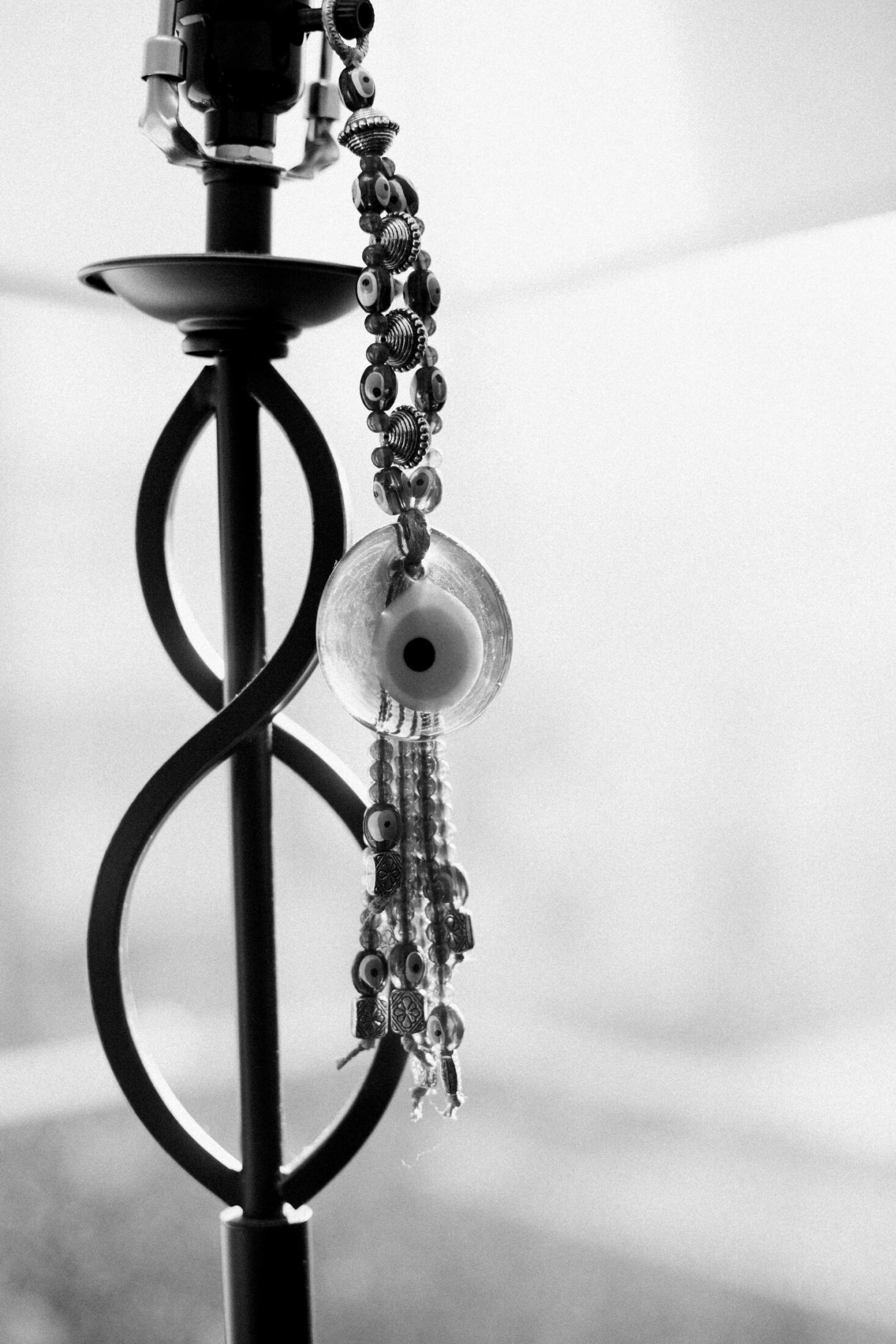
Photo by Elena Mudd
I find God in silence. In early morning and late night. At moments when I am most alone. But I feel faith strongest in sound—the bleat of sirens, the music, the honking and yelling and construction. There is a miracle in the chaos, and the miracle is that the chaos has order.
The Italian writer Italo Calvino noted that for the traveler arriving in new cities, “the foreignness of what you no longer are or no longer possess lies in wait for you in foreign, unpossessed places.” This experience is where we are reborn. The opposite of erasure is witnessing, and my existence in cities is marked by daily pilgrimages. Each city often hides its corners of divinity in places of disarray and isolation—the mall kiosks of Dallas, the adhan-filled dawns of Beirut, snowcapped awnings in Brooklyn on the first day of winter. But also, there is natural access to people, both as individuals and through the macro phenomenon of crowds. People are most divine when caught unaware. Lost in thought, wandering down the wrong street, digging into their wallets for dimes.
Nowhere is the act of witnessing as vital. The emotional ecology of cities—rife with chance encounters of all kinds—is one of reciprocity. You witness and are witnessed.
Once, on Madison and 32nd, I saw a woman on the phone jumping up and down with good news, and I grinned at her. I hurried home holding the news like a warm coin, her excitement now mine as well.
The ecosystem of cities, however, is a fragile one, linking greed and inspiration and biodiversity. Here the relationship to nature is unique, fickle: the stars you glimpse only during a blackout, the weeds forcing their way between brick and concrete.
It’s the insignificant moments that remind me of God, such as the tiniest wrapper caught in the subway grate. As writer Rebecca Solnit declares, “A city always contains more than any inhabitant can know, and a great city always makes the unknown and the possible spurs to the imagination.” I can’t imagine the abundance of a city and I can’t imagine the abundance of God, and this inability delights me.
It’s the lesser things: The glimpse of sea between unfinished Beirut buildings, the delicate tattoo on the forearm of a woman adjusting her purse. The collision of existences, the intersection of our mistakes and our optimism. When a city reveals its fountains, its ancient restaurants and herb gardens, I am shown divinity. In the undeniably human, I am reminded of God.
The world can be undone by faith. The world has been undone by faith.
Reclaiming faith, then, is an act of resistance. In reciting those words my grandmother taught me, I am saying I am. I am saying my people were. I am saying my people continue to be. I am saying that our relationship to these beliefs may have changed throughout the generations, but my heritage hasn’t been erased. I hear my grandmother’s heartbeat from city to city. My superstitions, my car prayers, my shrines—they are ways of connecting the old world with the new.
Reclaiming faith is an act of resistance.
“But to be someone who loves possibilities,” you sometimes say, “is to have to allow for the possibility that there is nothing else out there.” That we are alone. That we are made of blood and return to dirt.
I have moments when I try to allow for that. I’ve sat at my keyboard and typed out the words “WE ARE ALONE.” Then the words start to quiver as if their very molecules were drifting. I think about the molecules. And the blood and the dirt and the tremble in your voice as you say these things. And that in itself is a miracle. Perhaps that’s the whole miracle.
I try to say this cerebrally. But the thing about miracles—they divide like a cell undergoing mitosis. One begets another. My mind works in a very adjoining way. Cities are places of creation, and I can’t help but find holiness in that. I remake myself in each place I live: Brooklyn, al-Ain, Tripoli. I remake my story with each poem I write. I watch the sentences appear like mushrooms in black soil after rain. The presence of smoke is what indicates fire; the presence of life, of discomfort, of passion, is what indicates God.
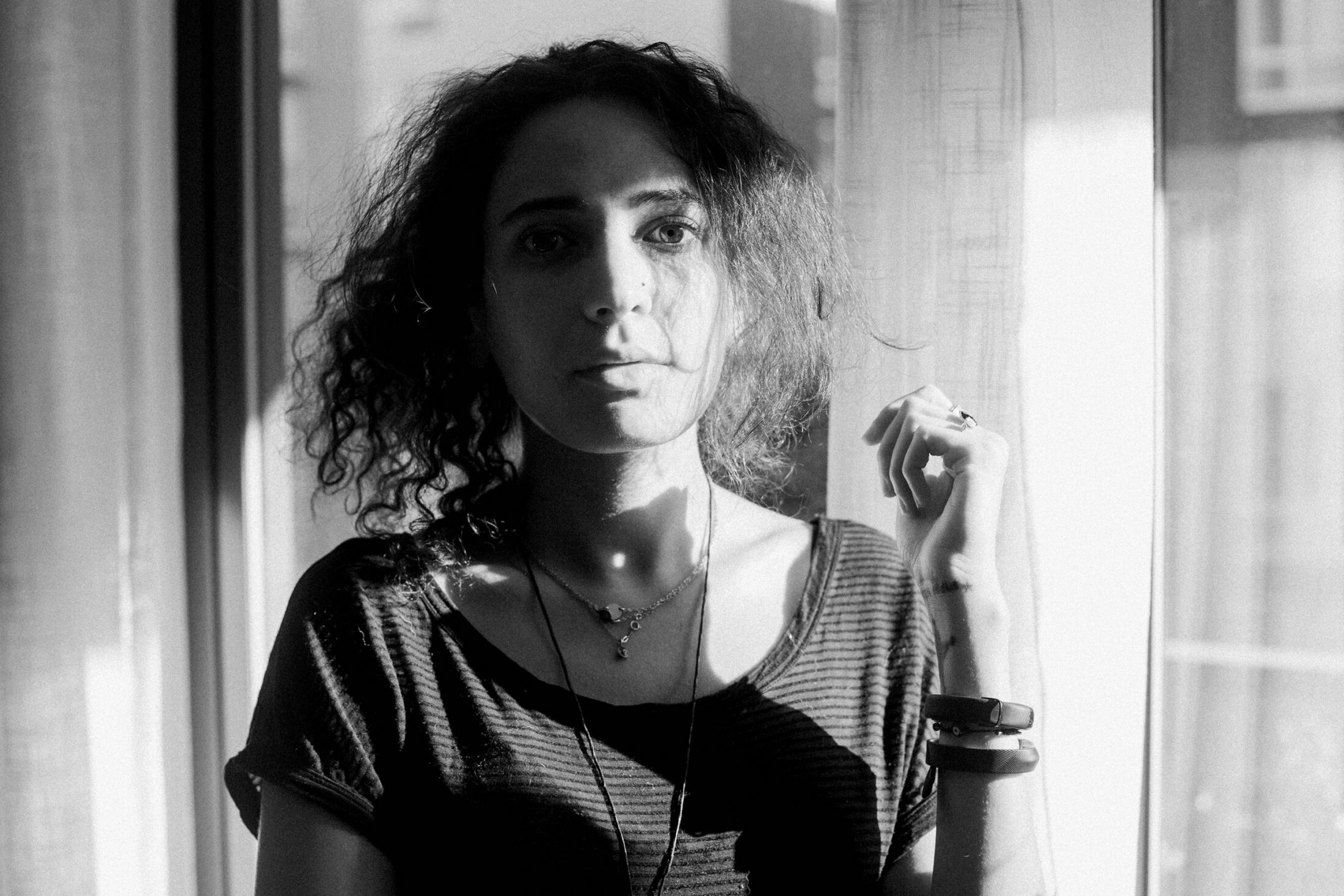
Hala Alyan by Elena Mudd
Like the emergence of cicadas, my faith has a seasonal pattern. I migrate to God at the end of certain seasons, the end of April and October. The subtle shifts and approaching changes remind me of my grandmother. Her heart, beating under my ear, still alive. How reciting those Qur’anic lines could have been seen as an act of futility, because did she not suffer? Did she not lose herself over the years, forget everything, including the word for “water”? Did she not lose her own name? Did we not lose Palestine?
And yet she recited those lines. She recited them, and she taught them to me, as her grandmother taught them to her. You might call it futility, and I would forgive you that. But for me it felt sacred to know that those suras might not change anything, might not protect against anything—save for their disappearance.
Once, in a city that was new to me, I sat in the living room of a sublet apartment and watched dusk fall. I had lived there only a week. That morning, I had woken up in a house I’d never seen before. I walked down thirty blocks and waited under the fluorescent light of a hospital room. It became clear that I had been drugged.
But later in that apartment living room, I recognized the sky, what I could see of it, between the buildings. I window-watched into the building across the street. A woman was just getting home, and I could recognize the slump of her shoulders as she flicked through a pile of mail. The gesture calmed me. Alone, I started to speak aloud to nobody or myself or God—it didn’t matter whom—but I spoke about the hospital and how my drinking scared me and how I wanted to go home. The woman stretched in front of the stove top, and my breathing evened. It would take work, I understood; my body would recover. The words turned into verses in the Qur’an. I recited, not to be overheard or rewarded, but to be reminded that I was here. I hadn’t been erased. I spoke aloud to speak myself back into the moment. I spoke to witness and be witnessed. I spoke to remember.
Here we are again. The drone of the dishwasher barely audible over our voices. It’s nearly winter now and I’ve been struggling, and you want to know what God is.
I tell you I don’t know. I tell you I do know. I try to explain about the fountains and migration, my grandmother’s voice vibrating beneath my ear. But language fails me and I let it. I make a home in that failure.
Perhaps faith has become synonymous with my grandmother. With the adhan in Beirut after a rave. With the cool pane of glass against my forehead after a bout of sobbing. With whatever courage or impetuosity is summoned to keep tempo with the city. Perhaps what I call faith is simply what you call life, and if it is so, I’ll take it. I have no attachment to being right or wrong. If I am wrong, I am wrong. But I am happy to have lived this way. Someday I will learn to say, “God is that which witnesses and asks for witnessing. That which listens and asks for the same in return. That which created, that which I create for.”
Glossary
al-Fātiḥa: the first chapter (sura) in the Qur’an
zakāt: “that which purifies”; a form of giving alms
sura: a chapter of the Qur’an
adhan: the call to worship
mashā’Allah: “what Allah wishes”
inshā’Allah: “if Allah wishes”
subhān’Allah: “glory be to Allah”
Nakba: the 1948 Palestinian exodus, also known as the Nakba, literally “catastrophe”
